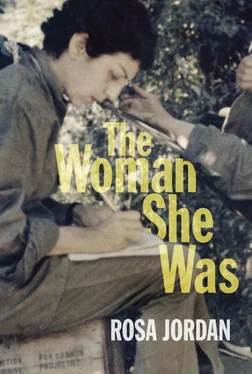“So much for fresh air,” she sighed, winding the window shut again. She would mention to Luis the inappropriateness of air conditioners in areas where temperatures were moderate. Screens would be perfectly adequate, and night sounds were infinitely preferable to the hum of an air conditioner.
As much to wash away thoughts of Luis as to rid herself of road dust, she stripped and showered. The water was not hot so she did not linger. She dried herself hard with a thin towel and jumped into bed nude and shivering.
In a few minutes she had warmed up enough to reach for her case and extract the sandwich she had made at Franci’s. Poor Bruno, she thought, sitting alone in a dreary bar waiting for her to come in so he might have someone for company during dinner. She did not exactly feel sorry for him, but in a way it was kind of sad. Sad that there were so many times when words were not appropriate and body language was not enough.
She got up and brushed her teeth, then crawled back into bed. Warm and fed, she felt utterly peaceful. Oddly, she also felt keyed up. Her emotions carried a current of excitement, but it was not the kind that generates tension. It was anticipation. Somehow, by luck or intuition, she had come to the right place. She was nearly at the epicentre, where it had all begun. If she was to find clues as to why her psyche had become entangled with what she imagined to be that of Celia Sánchez, might it not be here?
Eyes open in the darkness, she tried to recall historical accounts—or, more accurately, historical footnotes. For several minutes thoughts flowed in a logical, linear channel. Then, like a river in flood, her mind overflowed its banks and began sweeping up images without regard for source: books she had read, fragments from stories her mother had told her, half-listened-to conversations, and details that could not have been known or remembered by anyone except the woman her subconscious was shadowing.
It was not at the Comandancia that Sánchez and Castro had met. It was months earlier, near Manzanillo, beard so scraggly, younger than I expected, never seen eyes so bright, double-bright in the half-light of dawn . Sánchez had gone to let him know that Matthews, the reporter from The New York Times , had arrived. Who had told her that story—her mother perhaps, who had got it from Vílma? How Fidel had stayed out in the farmer’s field with Sánchez and other rebel leaders twenty-one hours of talk talk talk he understands everything organizes nothing; no matter, I can continue with that while they follow him he knows what must be done while Matthews cooled his heels in a peasant’s shack palm fronds like black cutouts in a sky white with stars, sleepy, sleeping, Frank País next to Fidel, Fidel next to me, Haydée and Armando together, Raúl and Vílma, Faustino, Guillermo, my people my family.
Sánchez had gone back to Manzanillo to expand her network, had smuggled more weapons and supplies to the guerrillas, and brought in more journalists. There was the CBS television crew she and Haydée took in two months later and stayed on, right through the battle of Uvero. Oh God the blood I spilled to kill who can say and what would my father say? When does killing to save my country become blood on my hands ? It was after that battle, needing a permanent base for a field hospital, that Sánchez had found the perfect hideaway. While Castro kept engaging Batista’s troops, moving from place to place, she remained at La Plata to oversee construction of the Comandancia. Look, Fidel, how hidden the buildings will be beneath the trees, how the land falls away on all sides; with one hundred soldiers you can stop ten thousand of theirs without such losses as we suffered at Uvero yes, you will have hundreds more I promise!
Sánchez returned to Manzanillo and in two months had recruited enough soldiers to double those under Fidel’s command, Celia’s mother among them. Thank God for my women where would we be without them? Shooting, sewing, nursing as needed how can men be so inept at taking care of themselves how can he command an army when he suffers such toothaches?
Sánchez had gone to Santiago next, recruiting and fundraising until Batista’s henchmen started closing in. Then she returned to the sierra, this time to stay. Springtime, the smell of gunpowder, the smell of blood, splintered trees toppled amongst alpine flowers, eardrums aching long after the bombs, silence.
Sensations more powerful than facts stormed Celia’s body, making it impossible for her to attach actual dates, places, and events to Sánchez’s time in these mountains. How much did she know anyway? The history of the Revolution was the history of los barbudos , “the bearded ones,” men’s big histories recounted in big books. Sánchez’s story, what little of it had been written, was told only in children’s books. She herself was given a copy of Celia Nuestra y de las Flores for her ninth birthday and in high school had read Celia, La Flor Más Autóctona de la Revolución , but what had those sanitized tales told her of the real woman?
Celia tossed fretfully, tangling the sheets and swatting at the odd mosquito. Why was it never stated that Sánchez began armed struggle in the sierra five years before Fidel arrived? Why wasn’t she celebrated for having found the Granma’s twelve bedraggled survivors and gotten them to safe houses, thereby saving them from being murdered like the other sixty Fidel had brought from México? Why was it never explained that she had decided that Fidel would command her troops, seasoned fighters who knew the sierra, so she could return to the city to recruit more, raise funds, and buy the weapons they needed? Why was it never acknowledged that it was Sánchez who chose the site of the Comandancia, brought Fidel there, supervised the construction, and integrated women into the rebel force? Why was it not said, simply, that in that time and place, Celia Sánchez had the most workable ideas as well as the final word on almost everything?
Celia’s mother had known this. So had all the others who’d served with them in the sierra. During gatherings of old compañeros in their home when she was a child, Celia had heard them speak admiringly of Fidel as their courageous commander but of Sánchez as the decision-maker and infallible strategist who guided him and inspired them. This was what they had witnessed during those years in the sierra. Yet not a word of that made it into those children’s books or into any of the museums that memorialized her. Like those portraits at Parque Lenin, history had preserved her in honey, as la flor autóctona, the sweet native flower.
Not a flower, Celia thought as she drifted into sleep. A woman who knew exactly what she wanted. If I find the woman, I will find…
CELIA woke from dreamless sleep to a darkness that felt familiar. She knew without looking at her watch that it was near dawn. She dressed quickly, not in the shorts she had taken off the night before but in the jeans she had worn on the train and a white shirt she had bought for Liliana that Liliana had not cared for so it had ended up in her closet. She double-knotted the shoestrings of her runners, and out of habit stuck a pen and notepad in the pocket of her shirt.
She hoped, as she started the car, that the sound would not disturb anyone. As there was only one road leading uphill, it should be easy to find the trail head. The important thing was to get past the park entrance before the staff came to work. She was only planning to do what dozens of tourists did daily; the difference being, she did not want to be accompanied.
She had barely cleared the villa when she came to a barricade, several sawed-off tree stumps rolled into the road to block traffic. The small building on the left would be the park office where visitors were expected to pick up a guide. At this hour, though, it was as dark. Celia swerved around the tree stumps and continued up the road. It was even more steeply pitched than the one she had come in on. It ended abruptly in a parking lot that, according to a large sign, was nine hundred and fifty metres above sea level. No wonder the Fiat had grumbled so. In five kilometres it had climbed more than seven hundred metres!
Читать дальше












